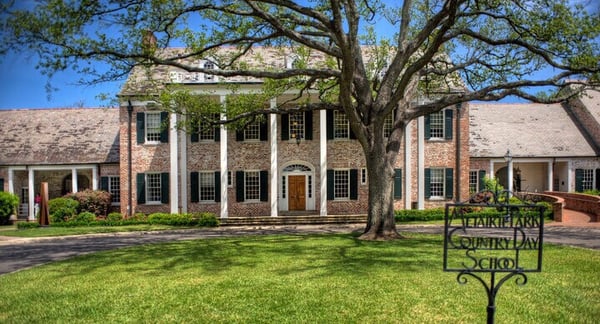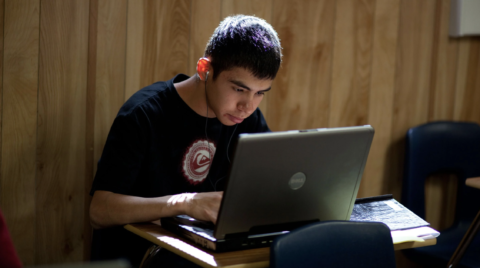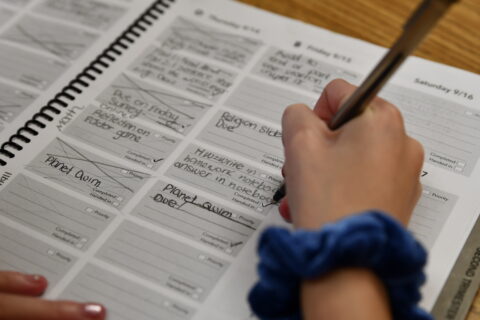In the fall of 2022, we interviewed Kate Turnbull, the director of professional learning at Metairie Park Country Day School in Louisiana. Kate also serves as the librarian, instructional coach, and teaches environmental science. She is the parent of a high school junior.
CTTL: Can you tell us how long you’ve been an educator and when was your first introduction to Mind, Brain, and Education Science (MBE)?
KT: This is my 22nd year in education. I attended the summer [Science of Teaching and School Leadership] Academy in 2019…maybe 2018. A friend of mine, who was also one of the translation group leaders — Derek Krein — he told me all about the Academy and St. Andrew’s. We attended the Academy and really fell in love with the whole thing. As a science teacher, and sort of a science nerd, I really was interested in the brain science and all of the research.
CTTL: Since then, what has your journey to becoming an MBE practitioner looked like?
KT: At the time, it was before I switched roles. I was a full-time teacher at the point. When I switched roles, and was really thinking about professional learning, what might work at our school, and what kinds of needs we might have, I asked the principals what they thought about attending the Academy themselves to learn more and see if it would be a good fit. So, that’s what happened. Our division heads attended the summer Academy when it was virtual. They all agreed that this was something that our faculty could benefit from, something we could all do together. We were really interested in the collective efficacy piece. So, that’s how it started. We had a new head [of school] come in, and we shared the idea with him. He attended the Academy this summer [2022]. We agreed to read Neuroteach together as a faculty beginning last Spring.
CTTL: I can only imagine how impactful it’s been to have your leadership involved early on.
KT: Yeah, I think it’s necessary. This is not something I could have ever done by myself. Again, with that collective efficacy piece we really needed everyone on board and interested. It couldn’t just be my project. I’m excited that everybody’s on board who needs to be on board to continue progressing.
CTTL: What’s your messaging to new and veteran teachers when it comes to MBE?
KT: I think Glenn [Whitman] always says it really well. This is not something new, necessarily, that we’re hearing. A lot of the research is confirmatory and helps us to see that we are doing things the right way, that a lot of us have really great instincts. So, that feels really good when you see that the research matches what you’re already doing. But, at the same time it’s always good for us to reflect on our practices and work collaboratively to make sure that we’re addressing the needs of our students. So, that’s kind of been how we’ve been addressing it with our faculty. We have a range of learners. We have new faculty who are just dipping their toes into teaching in general. We’re helping them formulate what really works in their classrooms. For faculty who have been here for a longer time, confirming that what they’re doing is the right thing, but also hoping that they’ll be open to reflecting on their practices moving forward.
CTTL: What kind of goals have you set for new teachers and veteran teachers for the year?
KT: So, this year, I think it’s also in Neuroteach, to give yourself a goal of making a 10 percent change. To try just one lesson or new project or new unit, and work toward using the MBE strategies. We have a giant slideshow that has everybody’s goals in it with what they think the barriers might be and what strategies they’re going to use. They just did another iteration of it during our last workshop. For some folks, this is something small like making sure they’re doing more formative assessments, and for some folks they’re thinking about a completely different approach to giving the students feedback. It’s a range, but the goal was 10 percent. You’ll see some faculty just take it and run with it, and they want to try all the things, which is great to see. We even have a few faculty who are conducting little experiments in their classrooms and collecting data, and that’s awesome. But the minimum goal was to just try 10 percent.
CTTL: What are some of the MBE strategies that your teachers are excited to try in class?
KT: Retrieval practice has been big; people really see the benefits of that. We also read Powerful Teaching a couple of years ago, and Make it Stick a few years before that. Feedback has been another one…belonging and setting up the learning environment for students. There’s a range, which is great to see.
CTTL: What impact on your teachers or students have you observed?
KT: We’ve just started doing some different share-outs, and there are a lot of teachers who are excited about what they’re doing, which is fun to hear. Just in passing, a teacher will come up to me and say, “I’ve been trying out X strategy, and it’s been really cool to see how the kids respond,” or “I had them do some metacognitive practices on their test, and it was great to see that the kids responded this way.” My son is a junior and it’s been fun to talk to him about it, too. He’ll say, “Oh yeah, in this class we were talking about retrieval practice.” So, the kids are starting to hear the language too, which is cool.
CTTL: Knowing that becoming an MBE practitioner takes an investment of time, what does success look like for yourself or for your school in the next three to five years?
KT: That’s something I’d like to talk more with our leadership team and faculty about. We’ve just started this process. I would love to see the kids learn more about their learning, so thinking through how we can make that happen, and involving the parents, too. How can the parents be a little more involved with their kids’ learning, especially when they are struggling? What are some ways they can help the kids understand strategies and what might be helpful? There’s so much opportunity for us to grow as a school and share with other schools.




